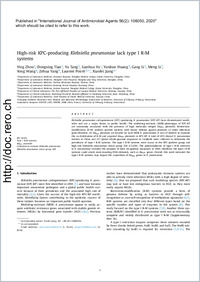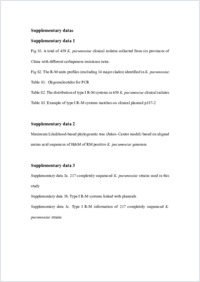High-risk KPC-producing Klebsiella pneumoniae lack type I R-M systems
- Zhou, Ying Department of Laboratory Medicine, Huashan Hospital, Shanghai Medical College, Fudan University, Shanghai, China
- Tian, Dongxing Department of Laboratory Medicine, Huashan Hospital, Shanghai Medical College, Fudan University, Shanghai, China
- Tang, Yu Department of Laboratory Medicine, Shanghai Chest Hospital, Shanghai Jiao Tong University, Shanghai, China
- Yu, Lianhua Department of Laboratory Medicine, Taizhou Municipal Hospital, Taizhou, China
- Huang, Yunkun Department of Laboratory Medicine Kunming Yan'an Hospital, Kunming, China
- Li, Gang Department of Laboratory Medicine, Jinshan Hospital, Shanghai Medical College, Fudan University, Shanghai, China
- Li, Meng Department of Clinical Laboratory, The First Affiliated Hospital of Guangxi Medical University, Nanning, Guangxi, China
- Wang, Yong Department of Clinical Laboratory, Shandong Provincial Hospital affiliated to Shandong University, Jinan, Shandong, China
- Yang, Zehua Department of Laboratory Medicine, Sixth Hospital of Shanxi Medical University, Taiyuan, China
- Poirel, Laurent Emerging Antibiotic Resistance Unit, Medical and Molecular Microbiology, Department of Medicine, University of Fribourg, Fribourg, Switzerland - Laboratoire Europeen ASSOCIE (LEA) INSERH, IAME (Paris, France), University of Fribourg, Fribourg, Switzerland
- Jiang, Xiaofei Department of Laboratory Medicine, Huashan Hospital, Shanghai Medical College, Fudan University, Shanghai, China
-
01.08.2020
Published in:
- International Journal of Antimicrobial Agents. - 2020, vol. 56, no. 2, p. 106050
English
Klebsiella pneumoniae carbapenemase (KPC)-producing K. pneumoniae (KPC-KP) have disseminated worldwide and are a major threat to public health. The multidrug- resistant (MDR)-phenotype of KPC-KP are commonly associated with the presence of high molecular weight blaKPC plasmids. Restriction-modification (R-M) systems provide bacteria with innate defense against plasmids or other infectious gene elements. As blaKPC plasmids are favored by such MDR K. pneumoniae, it was of interest to examine the co-distribution of R-M and acquired blaKPC plasmids in KPC- KP. A total of 459 clinical K. pneumoniae isolates in China and 217 global whole- genome sequences in GenBank were collected to determine the prevalence of type I R-M systems. The type I R-M systems were scarce in the KPC-positive group and high-risk Klebsiella pneumoniae clonal group 258 (CG258). The polymorphisms of type I R-M observed in K. pneumoniae revealed the ubiquity of their recognition sequences in DNA; therefore, the type I R-M systems could attack most invading DNA elements, such as blaKPC genes. Overall, this work indicated the type I R-M systems may impact the acquisition of blaKPC genes in K. pneumoniae.
- Faculty
- Faculté des sciences et de médecine
- Department
- Médecine 3ème année
- Language
-
- English
- Classification
- Biological sciences
- License
-
License undefined
- Identifiers
-
- RERO DOC 328930
- DOI 10.1016/j.ijantimicag.2020.106050
- Persistent URL
- https://folia.unifr.ch/unifr/documents/308900
Other files
Statistics
Document views: 154
File downloads:
- pdf: 608
- Supplementary material: 136
- a-217 global strains: 83
- b-I-R-M plasmid borne: 73
- C-R-M information: 87


